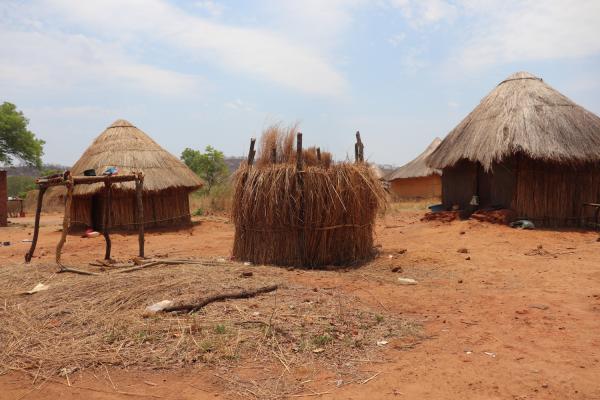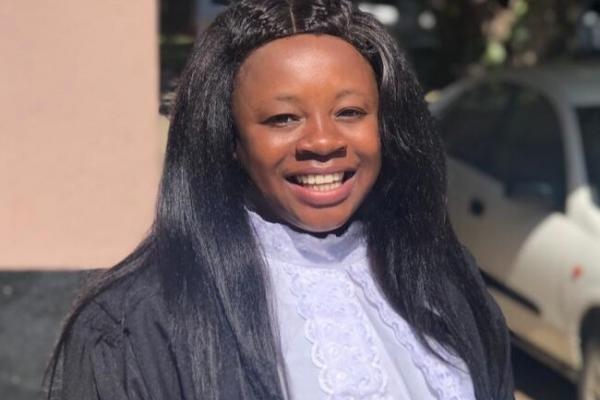
In poor, rural communities in Zimbabwe, miners put their lives at risk in the pursuit of gold, and it’s often women who suffer the consequences.
Netsai's story

In Manicaland Province, Zimbabwe, Netsai lives at home with her husband and two children. Often Netsai’s husband will pan for gold, make some money and then spend it all in one night. Then, on his return home, he frequently hits Netsai and calls her names.
Netsai and her husband live in a goldmining community, where informal goldminers endure all kinds of hardships – from non-existent safety standards to the threat of being buried alive – just to put food on the table.
In fact, these poorly-built mines can prove deadly: in November 2020, a mine collapsed in Bindura, and the year before, a flash flood trapped 40 people in a separate mine in the same region.
Miners, sleeping out in the open to protect their pits, can be attacked by hyenas, while others are exposed to the dust and dangerous fumes from working underground. The gold extraction process, which uses cyanide and mercury, causes many informal miners to become sick from long-term exposure to these harmful substances.
However, for many, the reward outweighs the risk. Goldmining offers a route out of extreme poverty, with mining accounting for 60% of exports from the country. It is estimated that informal mining accounts for two-thirds of this total – that is, mining done without the proper permits and permissions.
Nqobizitha NyakunuMany of these people are simply trying to fight the poverty that they are facing. These are people trying to feed their families and earn a living.
VSO national volunteer
Inside a goldmining community

The precarious and dangerous nature of goldmining no doubt adds to the stress placed on households in communities across northern and eastern Zimbabwe, with tensions often erupting into violence.
However, statistics on gender-based violence in these areas are hard to come by, with violence normalised and few women filing reports.
One male community member in Manicaland Province revealed some of the attitudes held towards women: “It’s a small community and has very little resources. This causes our women and girls to follow those illegal panners because they get a lot of money and so those men come and entice them.
“When a man hears about his wife having a relationship with one of these young men, he surely has a right to beat her up in order to correct her.”
While it might be shocking to read, these attitudes underline exactly why support from VSO, and partner organisation, Women and Law Southern Africa (WLSA), is necessary.
WLSA seeks to educate women and girls on their legal rights, improve access to legal assistance, and make sure that laws supporting gender equality are being put into practice.
For women like Netsai, experiencing the tension of living inside one of these communities, there is hope for the future.

After sharing her story, volunteers informed Netsai of her legal rights and told her how to report the violence, and what other support was available. Netsai’s husband was warned that his actions were breaking the law, and social workers were contacted to follow-up the case.
Don’t suffer in silence
Through the Speak It Loud project, a partnership between VSO and WLSA, Netsai can access free legal representation to seek justice. This project is made possible thanks to funding from the United Nations Trust Fund on Ending Violence Against Women and Girls.
Loice Mazvita is a legal practitioner supporting women to bring forward cases of domestic abuse.
“The judicial system in Zimbabwe is inconsistent and defective when it comes to cases of gender-based violence. Some perpetrators are arrested for a few days and then released, leaving the survivors, who are mostly women, more vulnerable.
“Prosecuting sexual offence cases can take up to two years before judgement is passed on the perpetrator. As such, women are reluctant to report cases of abuse and this has led to more women suffering in silence and being exposed to violence.”

The coronavirus pandemic has only exacerbated matters, says Loice, with cases of violence against women pushed to the back to the queue. Loice is working with other lawyers to make sure domestic abuse cases are heard as soon as possible, to restore faith in these communities that justice will be done.
With Zimbabwe under national lockdown, social media is one way Speak It Loud continues to reach vulnerable women, with posts encouraging women to not ‘suffer in silence’ and details of how to contact a toll-free helpline and report instances of violence.
When it is safe to do so, the next step is to run discussion forums for these mining communities. This is an opportunity to understand the issues faced by these communities, challenge some of the men on the attitudes they hold, and to help women realise their rights in relation to gender-based violence.
VSO volunteer, Nqobizitha Nyakunu, who participated in research into these communities, said, “Women can be assured that their voices will be heard, and have their cases brought before a court.”
If you are based in Zimbabwe and experiencing domestic violence, you can reach out to Women and Law Southern Africa on their Facebook page here.
(*Netsai's name has been changed to protect her identity.)
Transforming the lives of prison inmates in Zimbabwe
Alongside tackling domestic abuse, VSO also works in Zimbabwe to support prison inmates with HIV and AIDs, a group which is frequently overlooked and left behind. You can read more about VSO’s work in prisons here:
Improving the health and wellbeing of prison populations in Southern Africa
Read more

Transforming lives through education: Geoffrey’s VSO legacy
With a deep belief in the transformative power of education, Geoffrey from Norfolk, UK, has devoted his life both in the UK and abroad to making education more accessible for all.
